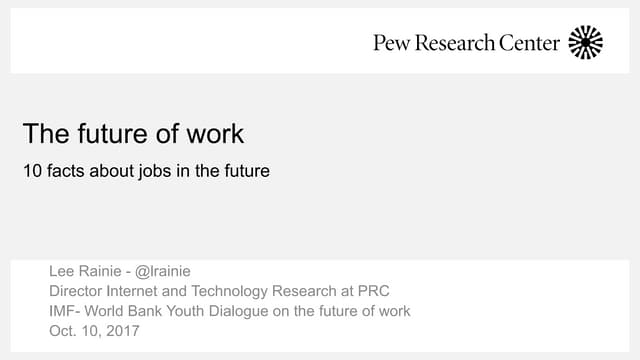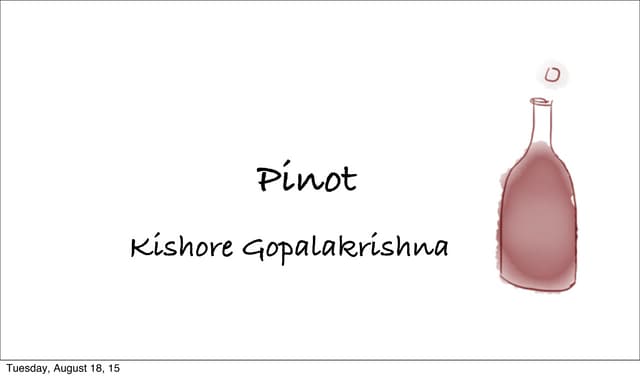-
Be the first to like this
Successfully reported this slideshow.
We use your LinkedIn profile and activity data to personalize ads and to show you more relevant ads. You can change your ad preferences anytime.
Like this presentation? Why not share!
-
The AI Rush by Jean-Baptiste Dumont 1862017 views
-
AI and Machine Learning Demystified... by Carol Smith 3908479 views
-
10 facts about jobs in the future by Pew Research Cent... 906765 views
-
Harry Surden - Artificial Intellige... by Harry Surden 779685 views
-
Inside Google's Numbers in 2017 by Rand Fishkin 1368161 views
-
Pinot: Realtime Distributed OLAP da... by Kishore Gopalakri... 629689 views
"You get out what you put in": how students perceive their 'learner journeys' at the University of Worcester - Devine
43 views
Published on
Presented at LILAC 2019
Published in:
Education
No Downloads
Views
Total views
43
On SlideShare
0
From Embeds
0
Number of Embeds
0
Actions
Shares
0
Downloads
0
Comments
0
Likes
0
Embeds
0
No embeds
No notes for slide
Orange – level 5
Blue – level 6
Image from: https://pixabay.com/vectors/graduation-silhouette-boy-cap-1345123/ ; free for commercial use without attribution (Accessed 30 March 2019).
"You get out what you put in": how students perceive their 'learner journeys' at the University of Worcester - Devine
- 1. “You get out what you put in”: how students perceive their “learner journeys” at the University of Worcester Kathryn Devine BA (Hons), MA, MSc, PGCHE, FHEA Academic Liaison Librarian, University of Worcester
- 2. Definition of “learner journey” Not limited to student’s module and assessment pathway Rather, encompasses the whole skillset they build as they navigate the course Information literacy is a key part of this “journey”, and one in which librarians are “uniquely qualified to help”(Pritchard, 2010, p.273; see also Owusu-Ansah, 2004)
- 3. Why is the learner journey significant? Today’s graduate requires a more complex and varied skillset than ever before “Graduates need to be more creative, more media literate, more skilled cross-culturally, and more capable of leadership” and have the ability to think “critically about an enormous amount of information” and solve “complex, multidisciplinary, open-ended problems” (Poole, 2013, p.348) This means the learner journey becomes more complex, “starting from an earlier point and journeying to a more distant one” (Poole, 2013, p.348)
- 4. What is the library’s role in the student experience? Increased teaching focus – and importance of embedded and aligned information literacy instruction Librarians need to collaborate with academic staff to “address the complexity of the current information environment” (Gibson and Jacobsen, 2018, p.183) Information confidence makes for a better student experience. With student experience “high on the national agenda” (Douglas et al., 2015, p. 330) the role of the librarian in increasing this confidence has never been more important Widening participation agenda: supporting a range of student needs
- 5. Research background The student learner journeys project followed a similar exercise carried out with academic staff This led to the development of a Teaching Menu, into which the present research is feeding
- 6. Some students still have referencing “issues” or get “caught on cheating offences” Students should be able to refine and put into practice the research skills taught in L4 and L5 Students should use a wider range of resources and critical materials, i.e. googling less and using a wider range of journals and databases Students become better at synthesising information, though many still struggle Students need to use the library “proficiently” Some students lack basic academic writing skills Students … need the resources to cope when a search doesn’t work the first time … to embrace academic debate rather than “find the right answer” Academics
- 7. University of Worcester context Post-1992 university in the English Midlands 10,747 enrolled students in the 2016-17 academic year 12% of the student body identify as having a disability Nine academic schools (7 “institutes” at the time of the research) Four campuses One library – The Hive
- 8. Research aims and objectives Sought increased understanding of student perceptions of their learner journeys by asking: What are the issues, roadblocks, pressure points along the way? When do these occur? Concurrently, asked students for their understanding and opinions on Library Services’ role within the journey From this information, consideration of how library teaching and support could be improved, realigned, or retimed
- 9. Research design and method Qualitative – focus groups/focused interview Gathering rich data around student perceptions rather than testing a hypothesis; a holistic “feels right” analysis (Corbin and Strauss, 2015, p.57) Aimed to recruit participants via purposive sampling
- 10. The participants 5 participants 2 female; 3 male 1 first year (level 4) 2 second year (level 5) 2 third year (level 6) 3 mature students (2 male, 1 female) 5 White British 1 declared disability (Autism Spectrum Disorder)
- 11. The focus groups/interview process Discussion allowed to flow organically Guiding questions in place but used sparingly
- 12. Emergent themes Five principal themes emerged during analysis: Transition to, and preparedness for, university Progression Personal responsibility and engagement Employability Communication
- 13. Transition Academic writing Critical thinking skills Disconnect between secondary/Further Education and Higher Education Library anxiety Finding appropriate sources and using them well
- 14. Students Some first years had “no idea” A levels meant I ”knew how to write essays” I was “referencing complete rubbish” “You just feel like you don’t know what it is you’re asking” I didn’t feel we were “treated like students” until second year Tutors thought I had a “higher level” of academic writing skill than I really did. Transition from A- level to university is like moving from “a paintball game to the Falklands War”
- 15. Progression Scaffolding of learning Students’ sense of clear progression (or otherwise) through modules to create a cohesive whole The perceived “jump” in difficulty/expectations of tutors at level 5 in comparison with level 4
- 16. Students At level 5, I’m expected to “go away and figure it out for myself” I’m “scared stiff” of writing my dissertation Moving up to level 5 is a “sudden sharp drop” Modules seem to be “just slotting into any year … a complete mismatch” Going from first to second year it’s just like 100% more workload It was “explicit that each assessment built on (to) the next one” They didn’t prepare us, but they did warn us
- 17. Personal responsibility/engagement The need for students to do things for themselves Seize opportunities Taking responsibility for seeking help when things go wrong University should encourage students to do this from the outset
- 18. Students At A-level you get factsheets for everything; at university you need to get out there and form your own opinion Tasks are set with a purpose but student don’t always do them Staff can only do so much You need to “go out there and actually ask for it” “Mature students … know what it’s like to work for deadlines … they know (how) to deal with stress” A baseline expectation of my course is a willingness to learn and listen, to try new things
- 19. Employability Readiness for the “real world” Can the university environment replicate real world experience? The learner journey as a lifelong experience
- 20. Students “Are we just using the term ‘learner journeys’ as an academic phrase for ‘life’?” I’m in third year but I don’t feel like I’m completely finished … there are options out there; there’s progression There is no sense of urgency at university University is “a surreal experience … between school and the real world” After the course I feel like the journey is just going to stop Law is “all geared towards getting that job”
- 21. Communication Impact of communication failure Importance of clearly communicating what services are available to students and who is responsible for delivering them Most dissatisfaction was in some way a product of a communication breakdown or failure
- 22. Students “It’s a very bureaucratic institution” “There’s obviously been a lot of dialogue between the library and my lecturers, but they don’t seem to have got anywhere” “The biggest thing for me … is talking to someone” “Sometimes it feels like … the library and the university are separate entities” “Just go out there and say ‘I need some help’” “There’s nothing worse than asking questions … and not getting the answers”
- 23. Implications for information literacy practice Need for clarity around extent and remit of service Taking services to students rather than waiting for them to come to us Meaningful partnerships with academic staff Need for timely, aligned teaching interventions
- 24. References Corbin, J. and Strauss, A. (2015) Basics of qualitative research: techniques and procedures for developing grounded theory. 4th edn. London: Sage. Devine, K. (2018) Undergraduate students’ perceptions of their “learner journey” at the University of Worcester and Library Services’ role in this journey. MSc thesis. Robert Gordon University. Available at: https://eprints.worc.ac.uk/6907/ (Accessed: 30 March 2019). Douglas, J.A. et al. (2015) ‘Understanding student satisfaction and dissatisfaction: an interpretive study in the UK higher education context’, Studies in Higher Education, 40(2), pp. 329-349. doi: 10.1080/03075079.2013.842217. Gibson, C. and Jacobsen, T.E. (2018) ‘Habits of mind in an uncertain information world’, Reference & User Services Quarterly, 57(3), pp. 183-192. doi: 10.5860/rusq.57.3.6603. Knapp, J.A., Rowland, N.J. and Charles, E.P. (2014) ‘Retaining students by embedding librarians into undergraduate research experiences’, Reference Services Review, 42(1), pp. 129-147. doi: 10.1108/RSR-02-2013-0012. Owusu-Ansah, E.K. (2004) ‘Information literacy and higher education: placing the library in the center of a comprehensive solution’, The Journal of Academic Librarianship, 30(1), pp. 3-16. doi: 10.1016/j.jal.2003.11.002. Poole, G. (2013) ‘The coming and going: the work of educational developers when admission criteria and desired outcomes change simultaneously’, International Journal for Academic Development, 18(4), pp. 344-355. doi: 10.1080/1360144X.2012.696195. Pritchard, P.A. (2010) ‘The embedded science librarian: partner in curriculum design and delivery’, Journal of Library Administration, 50(4), pp. 373-396. doi: 10.1080/01930821003667054.
- 25. Kathryn Devine Academic Liaison Librarian University of Worcester Email: k.devine@worc.ac.uk Telephone: 01905 542919 Twitter: @katdevine76







Be the first to comment